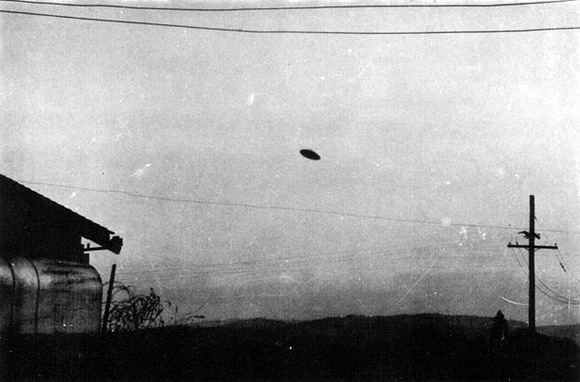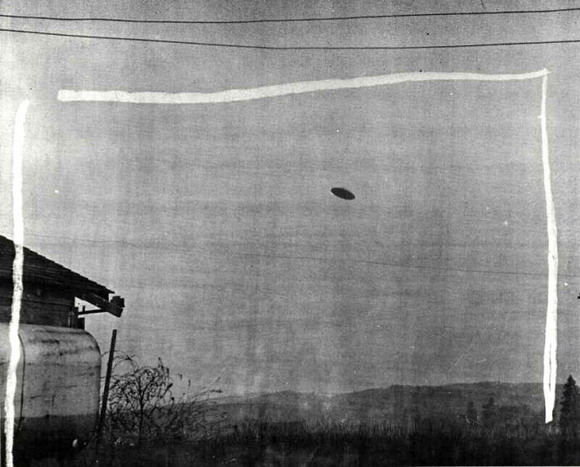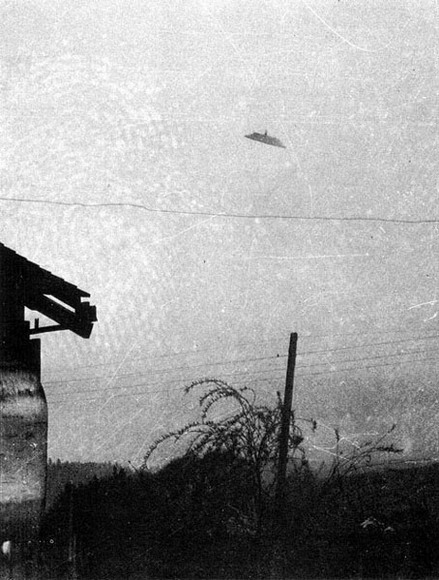


Background
Information/Description:
McMinnville,
Oregon - May 11, 1950: Two of the most notorious UFO photos
of all time were taken on a farm near Mcminnville by a
farmer named Paul A. Trent. Beyond many such cases, these
two photos have withstood the test of time--through generations
of researchers. It could be said that this case specified
the boiling point for the heated ongoing debate over what
qualifies as physical evidence--at least when it comes
to the subject of UFOs.
Mrs.
Trent was outside getting finished feeding her rabbits,
when she noticed the large, disc-shaped object approaching
from the northeast. She called out to Mr. Trent who joined
her to look at the mystery device. After a few moments,
he went back in the house to get his camera. He got back
out and picked a spot to stand and took the first picture,
then wound the film for the next picture. (That was typically
a time consuming process with a 1950 box camera.) Several
minutes later, he took the other.
In
the meantime, Mrs. Trent called out to her in-laws on
their porch, about 400 feet away. They didn't hear her,
so she ran into the house to call them on the telephone.
Mrs. Trent's mother-in-law didn't get to see it because
it disappeared by the time she was off of the phone, but
Mrs. Trent's father-in-law did catch a glimpse of it just
before it disappeared in the west.
Mr.
Trent waited to finish the roll of film before he got
the pictures developed. They were displayed nearly a month
later in a local bank. (The Trents' banker worked there.)
A reporter named Powell, who worked for the McMinnville
Telephone Register, saw the photos and convinced the Trents
to let him publish their story and photographs. However,
it did take a bit of coaxing because the Trent's feared
they might get in some kind of trouble with the government.
The
photographs and story wound up in the June 26, 1950 issue
of Life, who borrowed the negatives from Powell. The Trents
didn't get the negatives back for another 17 years. They
were requested for examination by the Condon investigation
in the late 1960's, and after that analysis was done,
they were finally sent back to Mr. Trent.
The
first people to examine the negatives found no signs of
manipulation of the negative and no visible means of support
for the UFO pictured, and so it has remained, for over
half a century. No scientific study of this case has ever
revealed anything that contradicts the witnesses or their
fortunate photos. (NURMUFO)
See
also the in-depth analysis, "The Trent Farm Photos",
by Bruce Maccabee, available online at:
http://brumac.8k.com/trent1.html
---------------------------------
(From
UFO Casebook / B. J. Booth)
A
classic set of impressive UFO photos was taken by Mr.
and Mrs. Trent in the early part of the evening, just
before sunset, on May 11, 1950, near McMinnville, Oregon.
According to the Trent's account the object, as it appeared
over their farm was first seen by Ms. Trent while she
was feeding the farm's rabbits. She then quickly called
her husband who got the family's camera and Mr. Trent
then took two shots from positions only just a few feet
apart. The pictures first appeared in a local newspaper
and afterwards in Life magazine. Seventeen years later
the photos were subjected to a detailed analysis for the
University of Colorado UFO Project.William K. Hartmann,
an astronomer from the University of Arizona, performed
a meticulous photometric and photogrammetric investigation
of the original negatives, and set up a scaling system
to determine the approximate distance of the UFO. Hartmann
used objects in the near foreground, such as a house,
tree, metal water tank, and telephone pole, whose images
could be compared with that of the UFO. There were also
hills, trees, and buildings in the far distance whose
contrast and details had been obscured by atmospheric
haze.
Hartmann
used these known distances of various objects in the photo
to calculate an approximate atmospheric attenuation factor.
He then measured the relative brightnesses of various
objects in the photos, and demonstrated that their distances
could generally be calculated with an accuracy of about
+/- 30%. In the most extreme case, he would be in error
by a factor of four. He then wrote:
"It
is concluded that by careful consideration of the parameters
involved in the case of recognizable objects in the photographs,
distances can be measured within a factor-four error ...
If such good measure could be made for the UFO, we could
distinguish between a distant extraordinary object and
a hypothetical small, close model."
Hartmann
then noted that his photometric measurements indicated
that the UFO was intrinsically brighter than the metallic
tank and the white painted surface of the house, consistent
with the Trent's description that it was a shiny object.
Further, the shadowed surface of the UFO was much brighter
than the shadowed region of the water tank, which was
best explained by a distant object being illuminated by
scattered light from the environment.
"it
appears significant that the simplest most direct interpretation
of the photographs confirms precisely what the witnesses
said they saw"
Hartmann
further wrote that "to the extent that the photometric
analysis is reliable, (and the measurements appear to
be consistent), the photographs indicate an object with
a bright shiny surface at considerable distance and on
the order of tens of meters in diameter. While it would
be exaggerating to say that we have positively ruled out
a fabrication, it appears significant that the simplest
most direct interpretation of the photographs confirms
precisely what the witnesses said they saw."
In
his conclusion, Hartmann reiterated this, stressing that
all the factors he had investigated, both photographic
and testimonial, were consistent with the claim that "an
extraordinary flying object, silvery, metallic, disc-shaped,
tens of metres in diameter, and evidently artificial,
flew within sight of [the] two witnesses."
(Thanks
to UFOCasebook.com for information about this classic
photographic case.)
An
in-depth, scientific analysis of this case was conducted
by Dr. Bruce Maccabee, optical physicist. His paper can
be found at:
http://brumac.8k.com/trent2.html
Sources:
http://www.ufoevidence.org/photographs/section/topphotos/photo301.htm
McMinnville_Oregon_-_May_11_1950.html
